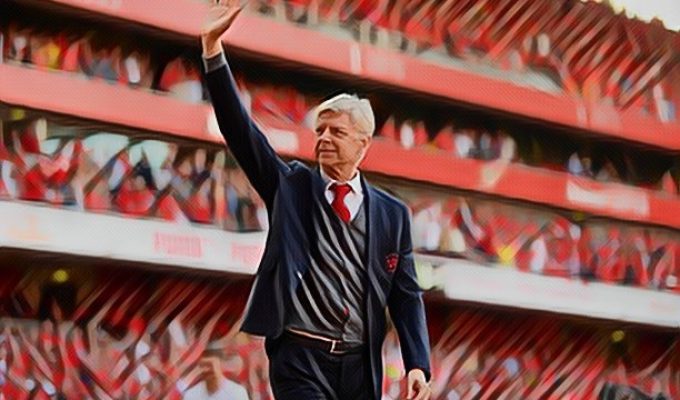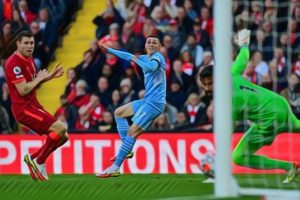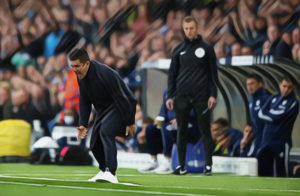Arsenal are currently preparing for their fourth season in the post-Wenger era.
The club’s longest serving and most successful manager, Wenger was in charge for 22 years, winning three Premier League titles, including the infamous unbeaten season of 2003/04, and 7 FA Cups, the most of any manager in the competition’s 150-year history.
Despite such achievements, many Arsenal fans often split the Frenchman’s reign into two periods, characterising the first half of his time in charge as a success and the latter half as a failure.
There is some logic behind these arguments. Wenger’s (and Arsenal’s) last league title came in the much-celebrated unbeaten season. There was a nine-year trophy drought between 2005 and 2014, during which time the pressure on Wenger ratcheted up from both the media and fans alike.
Arsenal also became increasingly uncompetitive following the move to the newly built Emirates Stadium in 2006. Hamstrung by construction costs, the club struggled to compete with the spending of mid-table clubs in the years thereafter, let alone that of their title rivals.
Consequently, whereas Arsenal often mounted strong challenges for the title during the first half of Wenger’s time in charge, finishing second five times alongside the three title wins while at Highbury, the latter half brought only sporadic challenges in 2007/08 and 2015/16 that faded come the business end of the season.
Yet there was some success in these later years. Three of Wenger’s seven FA Cup victories came in his final five seasons.
Moreover, Arsenal secured Champions League football in every season between 1997 and 2016, a record that is only surpassed by Real Madrid, the most successful club in the competition’s history.
To the mockery of all football fans and the media at the time, Wenger claimed this as success. In hindsight, with players such as Sebastian Squillaci, Marouane Chamakh, Nicklas Bendtner, and Andre Santos on Arsenal’s books during these later years, his top four record is remarkable.
Nonetheless, when analysing the points totals of each of those seasons, a pattern of stagnation is evident. Following the move to the Emirates, only once did Arsenal finish with more than 80 points under Wenger (the 2007/08 season), and only once did they finish higher than third (the 2015/16 season, when every other ‘big’ club was going through a season of transition).
This culminated in Wenger’s final two seasons charge in which Arsenal failed to secure Champions League football in both years.
Moreover, in his final season, the North London club finished sixth with 63 points, their worst ever points total and lowest ever finish under Wenger.
Such a pattern continued into Wenger’s successor Unai Emery’s reign. While reaching the Europa League final and finishing on 70 points in the 2018/19 season, 7 better than the previous campaign under Wenger, Arsenal finished fifth, again failing to secure Champions League football.
The following season led to further decline, with Arsenal enduring a seven-match winless run under Emery, their longest since 1992, resulting in the Spaniard losing his job at the end of November.
His eventual successor and current manager, fellow Spaniard Mikel Arteta, has thus far failed to turn the club’s fortunes around.
Arsenal ultimately finished eighth with 56 points in 2019/20, their worst league season for 25 years. They only secured European football through winning the FA Cup, the one high point in an otherwise poor season.
This trend continued into last season as Arsenal endured their worst start since the 1974/75 campaign, sitting in fifteenth place with fourteen points after the same number of games, and only 4 points above the relegation places.
Come the end of the season, Arsenal were again in eighth, albeit with five more points than the previous year. However, with no domestic cup victory, and a humiliating Europa League semi-final defeat to a Villareal side managed by previous manager Emery, the club failed to secure any European football for the first time in 25 years.
An argument can be made that Wenger would have done no worse than either Emery or Arteta had he remained in charge.
Such an argument is valid, but it is beside the point. The pattern of stagnation and decline started under Wenger’s tenure. Both Emery and Arteta then inherited the club’s problems that had been left by the Frenchman, including a squad filled with deadwood that Arteta only started to clear last season with the release of players such as Shkodran Mustafi and Sokratis Papastathopoulos.
For the club to begin to rebuild and return to a state of progression, Wenger therefore needed to go.
Indeed, with both Jurgen Klopp and Pep Guardiola becoming available in 2015 and 2016 respectively, he should have been relieved of his position sooner.
Obviously, it cannot be said with any certainty that Arsenal would have been able to secure either of these world class managers: both would have required significant transfer funds, a luxury not afforded to Wenger, and Klopp was taking a break from football after parting ways with Borussia Dortmund at the end of the 2014/15 season.
Nonetheless, Klopp had made his intentions clear after leaving Dortmund, with his agent stating that the German would return to football for the right job, a position that turned out to be at Liverpool in October 2015. Klopp had also stated that, besides Germany, England was the only country where he would manage because of his understanding of the language.
The German was linked with the manager’s job at Arsenal during his last season at Dortmund, as was Guardiola during his final season at Bayern Munich a year later.
Guardiola had also spoken highly about the style of football played at Arsenal under Wenger, something which made the Spaniard a logical fit to succeed the Frenchman.
Had Arsenal therefore parted ways with Wenger sooner, there was a chance that they could have secured either manager, both a higher calibre than Emery and Arteta, likely preventing the years of decline that have since occurred. The club instead stuck with Wenger out of loyalty, furthering the pattern of stagnation and decline that Arsenal are struggling to rebuild from.






